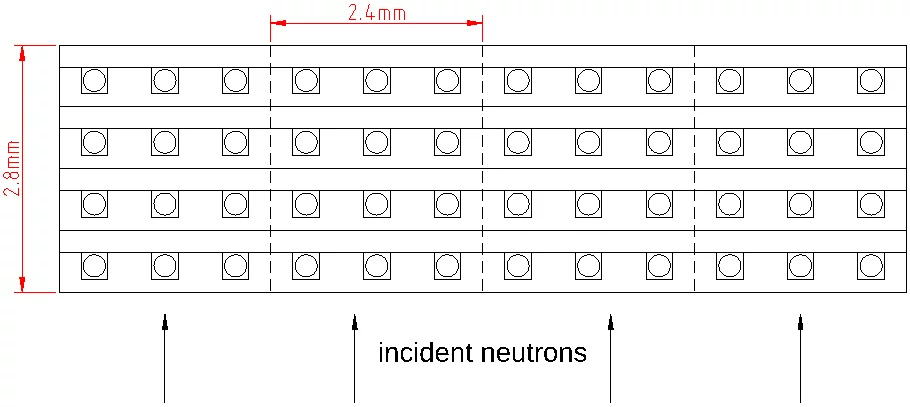To allow a simultaneous measurement of the axial and transverse strain components during in-situ measurements, the actual 3He detection module will be replaced with two pairs of detection modules oppositely placed around the sample.
The new detector is developed by the MSS group, in collaboration with the detectors group and the electronics and measuring systems group of the laboratory for particle physics at PSI.
A detection module will possibly consist of 4 sandwiches made of two ZnS/6LiF scintillating layers sandwiching an array of wavelength shifting fibers. The fibers belonging to the same channel are grouped toghether and coupled to a silicon photomultiplier. The use of Silicon photomultipliers instead of photomultiplier tubes is motivated by their high packing fraction and their insensitivity to magnetic fields, two important characterisitcs in this project since the space in the POLDI experimental area is very limited and tests of samples in high magnetic fields are foreseen.
The new detector is developed by the MSS group, in collaboration with the detectors group and the electronics and measuring systems group of the laboratory for particle physics at PSI.
A detection module will possibly consist of 4 sandwiches made of two ZnS/6LiF scintillating layers sandwiching an array of wavelength shifting fibers. The fibers belonging to the same channel are grouped toghether and coupled to a silicon photomultiplier. The use of Silicon photomultipliers instead of photomultiplier tubes is motivated by their high packing fraction and their insensitivity to magnetic fields, two important characterisitcs in this project since the space in the POLDI experimental area is very limited and tests of samples in high magnetic fields are foreseen.
Comparison of the specifications (current and new detector).
| Current detector | New detector | |
|---|---|---|
| Module size | 1 x 0.2 m² | 1 x 0.2 m² |
| Number of modules | 1 | 4 |
| Vertical coverage | ±3.2º | ±6.4º |
| Horizontal coverage | 2θ=75º to 105º | 2θ=75º to 105º |
| Angular channels | 400 | 400 |
| Spatial resolution | 2.5 mm | 2.5 mm |
| Detection efficiency at 1.2 Å | 65% | 65% |
| Time resolution | < 2 μs | < 2 μs |
| Sustainable count rate | 4 kHz / ch | 4 kHz / ch |
| Gamma sensitivity | No issue | < 10-6 |
| Background rate | 0.003 Hz / ch | 0.003 Hz / ch |
